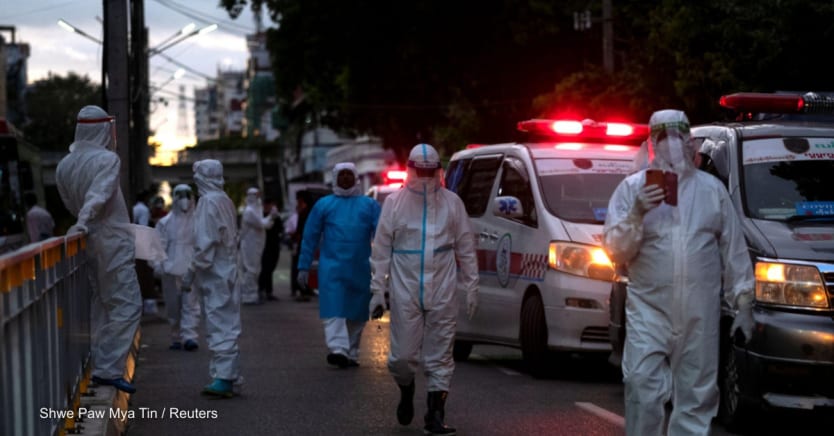
Long before Myanmar’s military raided homes and arrested members of the then-ruling National League for Democracy in the early hours of Feb. 1, 2021, Dr. Zaw Wai Soe had been a well-known voice on health in the Southeast Asian country.
A top orthopedic surgeon and former rector of the University of Medicine 1 in Yangon, one of the country’s oldest institutions, he had been instrumental in developing spine surgery and emergency medical networks across the country. He had led on policy reform projects, shared ideas at myriad events — including a Yangon TEDx Talk viewed nearly 10,000 times on YouTube — and, amid the first wave of the COVID-19 pandemic, had been appointed a senior member of the country’s coronavirus task force.
The must-read weekly newsletter for exclusive global health news and insider insights.
So when Zaw Wai Soe turned down an offer from the military on Feb. 6, 2021, to act as its deputy minister for health after a violent coup that saw thousands of protestors take to the streets and instead opted to join the ranks of the quickly swelling civil disobedience movement, known by the shorthand CDM, he said his first thought was about how health care could survive in the midst of conflict.
“[After the coup] I was preparing for charity hospitals, clinics, and a COVID-19 control center,” he told Devex, speaking from an undisclosed location via Zoom. “If I had joined CDM on day one, there would have been a lot of problems, as we wouldn’t have prepared services for the people. In some areas, 80% or 100% of health care workers decided to join the CDM. The hospitals were empty. So, I joined on Feb. 8. And after that, many people followed.”
His concern wasn’t misplaced. One year on from the military coup, health care facilities have been attacked or occupied, and hundreds of health care workers have been arrested or remain in hiding. Levels of fear and intimidation are such that many citizens are too afraid to access the services that remain.
‘A systematic attack on health’
Human rights organizations paint a chilling picture of events on the ground.
In January of this year, Physicians for Human Rights — alongside Insecurity Insight and Johns Hopkins University’s Center for Public Health and Human Rights — published a report that describes patients forcibly evacuated from hospitals, raids on charity clinics, and an ambulance carrying COVID-19 patients turned away from a hospital at gunpoint.
“Health care has been attacked on every level,” said Lindsey Green, a program officer at PHR, in a phone interview with Devex. “From arrest, intimidation, and killing of health care workers to the occupation of and attacks on health care facilities, confiscation of supplies, and attacks on charity organizations — this represents a systematic attack on health care in Myanmar, with chilling long-term impacts.”
It's against this backdrop that Zaw Wai Soe and the so-called National Unity Government — an underground opposition group that was established in April by leaders of the resistance movement, in which he is now minister for both health and education — have been among those seeking to provide a fragmented network of treatment to the sick and injured, largely in the shadows.
The NUG operates a system both “online and on the ground,” he said. On the one hand, new tertiary hospitals have been established in safer rural areas where many health care workers have fled, allowing for specialist spinal surgeries and emergency medicine that would otherwise not have been possible so far from Myanmar’s major cities.
But in those areas where the military retains control, it is only via a patchwork network of underground clinics, some in facilities as basic as poorly lit shipping containers with limited equipment, that those in fear of arrest or violence can seek treatment.
Via a “real-time digital system,” images of injuries are sometimes broadcast to a network of health care providers to provide remote advice on treatment, said Zaw Wai Soe. Always in fear that the military will cut off its internet connection, the NUG also provides facilities with satellite phones, he added. All of this is at huge personal risk.
“We don't have enough medicine. We don't have enough equipment. We have manpower, because we have … doctors and nurses [in the civil disobedience movement].”
— Dr. Zaw Wai Soe, health and education minister, National Unity Government“We are risking our lives,” the physician said. “Our doctors and nurses are risking their lives to provide health care for people. They shoot us, they kill us, they arrest and torture. They burn our houses. All people are terrified and [are] being threatened. Every day we lose lives, we lose our people.”
This threat isn’t only extended to active members of the CDM or NUG either.
“If you are overstepping the lines, it's been made clear to health care workers by the military that ‘we will persecute you’, said Sandra Mon, a researcher at the Center for Public Health and Human Rights, during a phone interview with Devex.
“You've got a target on your back as a person providing health care because of the precedent that's been set by those joining the CDM. If you're a health care worker, you may be accused of being part of the resistance [or sympathetic to the military] because there's such a vigilante system of persecution right now on both sides,” she said. “Doctors and health care workers are straddling that line of trying to work with utmost neutrality — and even then, it could be held against them.”
A third wave of COVID-19, which struck the country during the summer of 2021, only amplified the inadequacy of current services. Zaw Wai Soe said the military raided facilities to take control of oxygen cylinders and failed to provide quarantine and treatment centers. The NUG doubled its telemedicine service, he added, with thousands using it to seek advice. Elsewhere, pop-up clinics were established to provide ad hoc care.
The COVID-19 deaths were significant, he added. Zaw Wai Soe himself lost relatives to the disease, including an aunt and a sister.
“Many people that died during that third wave of COVID died at home without access to medical care,” Green said.
Though official figures are thought to underreport the full toll of COVID-19, the country has now seen more than 600,000 confirmed cases and 19,000 deaths. That marks a significant increase from the 2532 deaths reported by December 2020.
PHR is calling for the creation of humanitarian corridors supported by all stakeholders. It’s also “calling on the international community to push for the respect and protection of international humanitarian and human rights law as it relates to the protection of health care workers and health care services in situations like this,” Green said.
Mon pointed to the parallels between the situation in Myanmar and the one currently unfolding in Ukraine.
“Unfortunately, we're quickly seeing the same warfare tactics ramp up in Ukraine, which is extremely distressing but unsurprising. Knowing what we know about attacks on health from the conflicts in Myanmar, Syria, and Afghanistan, and given the tsunami of attention Ukraine has been getting from the West, this is our golden opportunity to really push for tangible actions through U.N. [United Nations] Security Resolution 2286, for the protection of health in conflict worldwide,” Mon said.
In the meantime, Zaw Wai Soe and the NUG face an uphill battle in continuing to deliver health care. Ad hoc funds are often provided via the Myanmar diaspora, with some donating all or part of their salaries to support the effort.
“The problem is, we don't have enough money,” Zaw Wai Soe said. “We don't have enough medicine. We don't have enough equipment. We have manpower, because we have the CDM doctors and nurses. They're working all around Myanmar, but we need money, medicine, and equipment. That's why I'm urging the international community: Please support us.”









